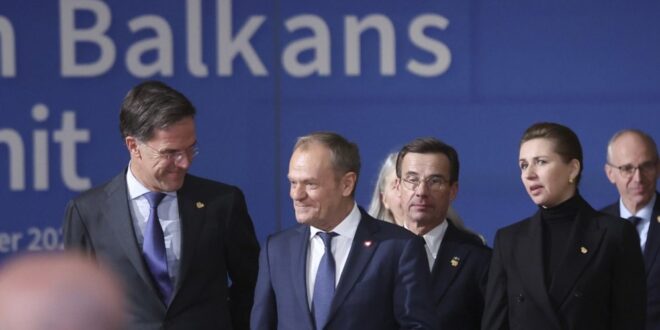Although it shares a number of common agenda items, Europe’s far right suffers from an essential schism when it comes to the question of enlarging the EU.
The EU will need to enlarge if it is to be fully equipped to face its long list of present and future geostrategic challenges. Yet most member states are still divided around the questions of how – rather than if – to reform the Union, and of when – rather than if – to enlarge it.
Amid a deeply-rooted identity crisis, the EU is at the same time being confronted with the breakthrough of the global far right. From the experiences of Donald Trump in the US, Narendra Modi’s India and Recep Tayyip Erdogan’s Turkey, ultra-nationalist conservatives and populists have taken the world’s democracies by storm and shaken them to their very foundations. Within the EU, the reactionary, authoritarian right is well settled in Budapest, Rome and Bratislava, and is gearing up for bigger takeovers across the 27.
Although the far right is diverse – running the gamut of the populist radical right to the hard right to the extreme right – its core goal remains dismantling the hard-earned democratic victories that help preserve human rights and civil liberties. The EU’s resistant but likely enlargement is fertile ground for these illiberal narratives to thrive, as it provides an essential intersection of key controversial issues – migration, security, geopolitics – that the far right seeks to capitalise on.
As the EU’s 27 member states head to the polls on June 6-9 in what will be milestone elections for the European Parliament – 373 million eligible voters electing 720 lawmakers – mainstream parties need to act in a joint front against reactionary forces and preach a politically mature discourse that is positive about enlargement of the bloc.
Two axes of far-right competition
Although it shares a sizeable number of common agenda items, the European far right aches from an essential schism when it comes to the question of enlarging the EU. Two main dimensions help understand these parties’ oftentimes dichotomous approaches to a broader Union.
The first dimension that articulates the EU far right’s enlargement appetite has to do with its political view over the Union’s mere existence.
On one side are parties and leaders that defend the survival of the EU but reject deeper integration among member states, and rather seek their mutation into an alliance of sovereign nations that can and ought to enlarge – which is the case of Hungary’s Viktor Orban, Italy’s Giorgia Meloni and Poland’s Jaroslaw Kaczynski. This category roughly corresponds with the European Conservatives and Reformists (ECR) group in the European Parliament.
On the other side are parties and leaders that long for the effective dissolution of the EU overall and are, therefore, against any attempt to expand it, let alone to countries that are thought to pose a threat to the identity and security of Europe’s immaculate Christian nations. This group encompass France’s Marine Le Pen and the Netherlands’ Geert Wilders, among others. Most of these parties are aligned with the Identity and Democracy (ID) group in the European Parliament.
The second dimension that divides the EU far right’s approach towards enlargement is its positioning vis-à-vis Russia. While Orban openly embraces Vladimir Putin’s regime and mimics the servility of Le Pen and the leadership of Alternative for Germany (AfD) – a significantly common practice among the ID group parties – a vast majority of the EU’s radical right does, in fact, reject any ties with Moscow. This is the case of Meloni and the party leaderships of Finland, Sweden and Poland, which largely articulates the identity of the ECR group.
Remarkably, these two dimensions play out differently depending on whose EU accession bid is being assessed.
The first category includes the years-long hopefuls of the Western Balkans. The far right’s schism vis-à-vis the six countries of the Western Balkans is channelled through the first dimension, essentially being for or against a larger Union. This frames the proactive and constructive approaches showcased by figures like Orban and Meloni – textbook examples of how being Eurosceptic does not imply a rejection of EU enlargement, but rather a search for a larger EU that is built upon illiberal and nationalist values. Orban’s close ties to the Serbian and Bosnian Serb regimes, and his explicit support for their EU accession bids, pay testimony to this ambition. The other side of the far-right spectrum, namely those parties that oppose enlargement as a principle, is naturally against the EU integration of the Western Balkan countries, as Le Pen and Wilders preach.
The second category, namely the cases of Ukraine, Moldova and Georgia, proves radically different. There, the schism occurs mostly along the second dimension: being with or against Russia. This frames, for instance, much of Orban’s rogue demeanour around the EU’s military aid to Ukraine and, of course, his overall scepticism towards Kyiv’s accession to the EU. On the other side of the spectrum, a vast majority of Moscow-critical far-right parties perceive their pro-enlargement stance as part and parcel of their opposition to Russia, which also feeds into their vision of a bigger and stronger ‘fortress Union’ of sovereign nations.
A wish list for mainstream parties
For a while now, the ball has been in the court of the EU’s mainstream parties – on whose hands falls much of the responsibility of laying out an honest domestic groundwork for enlargement, and of sending out a message of determination and integrity to the Union’s citizens.
This will, first and foremost, require some reckoning and self-introspection. The mainstream right, for one, should quit the replication of the far right’s anti-enlargement discourse, usually intertwined with discussions around migration and security, as this only contributes to a consolidation of extremist narratives within the right and centre-right of the political spectrum.
In parallel to this, all pro-European mainstream parties – particularly those at the left side of the spectrum, and even more so those holding office in the member states – must buy into the enlargement discourse and preach it with conviction to their citizens. Not only will this help to convey unity around a polarising topic, but will also help string a more durable cordon sanitaire against the xenophobic far right vis-à-vis an issue that is set to become all the more relevant in the public discourse – and all the more susceptible to manipulation and fake news.
As far as the Western Balkans, Ukraine, Moldova and Georgia are concerned, it is necessary for the EU to rebuild trust and to offer tangible guarantees while upholding a merit-based enlargement process. The Union must accelerate the gradual integration of (potential) candidate countries into its sectoral programmes and schemes, including the internal market. At a technical level, the negotiation process should be revitalised through the implementation of qualified-majority voting for interim phases, whose current absence places each minor procedural step under systematic vetting and potential vetoing from member states.
The upcoming EU mandate from the June 6-9 elections will be a mandate of enlargement. It will be up to the member states, as well as to the Union’s mainstream parties, to own the enlargement discourse, counter Moscow-friendly forces, which already hold two votes in the European Council, and detach themselves from anti-integrationist narratives.
All this will need to be carried out despite an ever more far right-leaning European Parliament, against which progressive and liberal forces will need to reaffirm the historical consensus that a larger and deeper EU is a better EU.
 Eurasia Press & News
Eurasia Press & News



